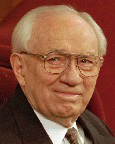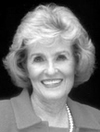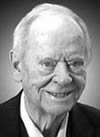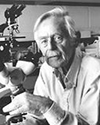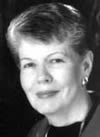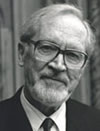|
About Continuum
Advertising
Advisory Committee
Archives
Contact Us
Continuum Home
Faculty/Staff Subscribe
related websites
Alumni Association
Marketing & Communications
University of Utah Home |
|

In MEMORIAM
Sally Rich Burbidge Cassity BA’52 died September
27, 2007, due to unexpected and extensive complications following major
heart and arterial surgery. She was 76.
Sally Rich was born in Ogden, Utah, on November 23, 1930, to Clark
Lowe and Dorothy Scowcroft Rich. She graduated from Ogden High school
in 1948 and received a bachelor’s degree in education from the
University of Utah, going on to teach fifth grade at Polk Elementary
in Ogden. She married Kenneth Parry Burbidge, Jr., on July 16, 1954,
in Ogden. They were later sealed in the Salt Lake Temple. Ken passed
away in 1998 following a long illness. Sally was fortunate enough to
find happiness and contentment in marrying F. Burton Cassity on February
10, 2001. They were great companions for each other and enjoyed their
time together in service, travel, laughter, and love.
Sally loved being in her garden, doing needlepoint, and traveling,
especially extended family vacations. She particularly enjoyed summers
in Sun Valley and winters in Palm Springs.
Sally was a faithful member of The Church of Jesus Christ of Latter-day
Saints, and her civic and charitable work was nonstop. Whether she was
fulfilling critical roles on the Ballet West, Kingsbury Hall, Libby
Gardner Hall of Music, University of Utah Alumni and Red Butte Garden
boards, University of Utah Board of Trustees, as self-appointed construction
manager on the Burbidge Athletics Academic Center, or “Fairy Godmother”
of the Utah Marching band, her efforts were tireless. Because of her
lifelong service, Sally was honored with the University of Utah’s
Distinguished Alumna award, the School of Music’s most prestigious
Camerata Award, and having the Utah Band Rehearsal Hall dedicated in
her name.
Sally is survived by her husband Burt; her sister Maryann Finley; three
children, Clark Rich Burbidge (Leah), Jill B. Wiscomb (Don) and Karin
B. Cook (Todd); 15 grandchildren; five stepchildren; and 25 stepgrandchildren.
She was preceded in death by her sweetheart Ken as well as her father
and mother. In lieu of flowers, the family suggests contributions to
the Sally and Kenneth Burbidge Pulmonary Chair, Central Development
Office, University of Utah, Salt Lake City, UT 84112, or the Sally Burbidge
Marching Band fund, Central Development Office, University of Utah,
Salt Lake City, UT 84112.
Edited from the notice published in The Salt Lake Tribune
from 10/2 - 10/5/2007.
Paul Cracroft BA’48 MA’54 died Feb. 11
from complications of heart disease, cancer, and diabetes. He was 85.
R. Paul Cracroft was born at home at 821 Markea Ave. in Salt Lake City
on Oct. 7, 1922, to Ralph and Grace Darling White Cracroft. Educated
at Wasatch, Bryant Jr., and East High schools, he decided at age 13
that he wanted to write. At 16, he was elected editor of East High’s
Red & Black for 1939 and won the first All-American rating
for a high school paper in Utah’s history. At the University of
Utah, he majored in English and wrote for all of the student publications,
winning campus and regional honors and editing the literary magazine,
Pen, in 1948. He met his future wife, Kathryn Storrs, on a blind date
on Aug. 23, 1941. From June 1942 to July 1944, he served in the North
Central States mission, headquartered in Minneapolis. After his return,
the two were married in the Salt Lake Temple by Elder (later President)
Harold B. Lee on Aug. 16, 1944, and moved to Camp Roberts, Calif., for
Paul to begin military training as a private. When the Battle of the
Bulge hit at Christmastime 1944, he was sent to Fort Benning, Ga., where
he was commissioned a lieutenant. He shipped out on Aug. 12, 1945, on
the USS George Clymer for what he later learned was the planned
invasion of Japan, canceled after the Japanese surrender when he was
just two days at sea.
Re-entering college in January 1947, he worked as a reporter for The
Salt Lake Tribune and then for Parry Sorensen as assistant director
of public relations at the U. From 1951 to 1955, he served in Washington,
D.C., as first press secretary to the late Senator Wallace F. Bennett.
Returning to the U in 1955, he worked for more than 35 years in public
relations as executive director of the Alumni Association, director
of Lectures and Concerts, instructor in journalism and, until his retirement
in 1990, as manager of Kingsbury Hall. In this last position he initiated
the first serious considerations that led to renovation of that great
hall. From 1959-1973, he hosted "Retrospect," a news analysis
show on KUED, Channel 7, which, in those early years, made it the longest-running
sustained weekly program on the educational channel. For 36 years he
also served as statistician for the U’s home football games, typing
play-by-plays and spotting for Paul James at away games during many
of those years.
As an active member of the LDS Church, he served twice as a member
of the High Council of the University of Utah Stake, twice as a bishopric
counselor, Bishop of the Parleys Fourth Ward (1977-1982), and Parleys
Stake high councilman. He helped write the History of Parleys Stake
from its official founding in 1958 to 2000 and was particularly proud
of a 479-page epic poem based on the Book of Mormon; he also wrote several
plays.
Paul and Kay Cracroft celebrated their 63rd wedding anniversary in
2007 before she preceded him in death that September. He was also preceded
by his parents, older brother Laurance White Cracroft, and grandsons
Thomas Paul and Bryant Jeffrey Parker. Paul is survived by his sister
Helen Grace Cracroft White, brother Richard H. (Janice) Cracroft; Kathy
(Don) Wilhelmsen, Shauni (Kent) Young, Patricia (Kent) Parker, David
(Terese) Cracroft, Paul Jeffry (Kathryn) Cracroft, and Randy (Gwen)
Cracroft; 19 grandchildren; and 11 great-grand children.
Edited from the notice published in The Salt Lake Tribune
from 2/13 - 2/15/2008.
Ernst Eichwald MD’53, University of Utah professor
of pathology and pioneering scientist, died at home in Murray, Utah,
on Dec. 23, 2007. He was 84.
Eichwald was born Dec. 13, 1913, in Hanover, Germany. He received his
medical degrees in Freiburg, Germany, in 1938 (when he moved to the
U.S.), and from the University of Utah School of Medicine in 1953. He
completed internships and pathology training in Dayton, Ohio, and at
the Children’s Hospital in Boston. He subsequently worked as an
assistant in pathology at Harvard Medical School, followed by service
in the U.S. Army from 1944-46 as Head of Laboratory Service at the 120th
General Hospital, New Guinea, Manila, Philippines, and Kyoto, Japan.
He returned to Children’s Hospital as assistant pathologist in
1946. In 1948, Eichwald moved to Salt Lake City to assume a faculty
position as an assistant and then associate professor of pathology at
the University of Utah. He was recruited to Montana Deaconess Hospital
in Great Falls, Montana, in 1953 under an arrangement that provided
resources to support his research program. In 1956, he established the
Laboratory for Experimental Medicine, which evolved into the McLaughlin
Research Institute in Great Falls, an independent biomedical research
institute that continues to thrive. He served as a professor of microbiology
at Montana State University, Bozeman, and chair of the Montana Chapter
of the American Cancer Society. In 1967 he returned to Salt Lake City
as professor of pathology and surgery, and chaired the Pathology Department
until his partial retirement in 1979. He continued laboratory work until
2003.
Eichwald was a pioneer of tissue transplantation. He described the
male-specific antigen; organized the first International Transplantation
Conference, sponsored by the National Institutes of Health, in Harriman,
N.Y., in 1953; founded and edited the journal Transplantation
for 30 years; and chaired the Transplantation Committee of the National
Academy of Sciences from 1955 to 1967. His research played an important
role in the development of successful protocols for organ transplantation
in humans.
Eichwald devoted much of his spare time to playing chamber music in
both Salt Lake City and Great Falls, Mont., and co-founded the Great
Falls Symphony. With passion for science, music, and life, he was also
a wonderful teacher and mentor.
Ernst Eichwald is survived by his wife, Irmingard (Sissy), daughter,
Jenny (Seattle), sons, Paul (Missoula) and John (Atlanta), stepsons
Andre (Salt Lake City) and Daniel (Salt Lake City), and grandchildren
Paul, Morgan, Heather, Ian, and Ryan.
Edited from the notice published in The Salt Lake Tribune
on 12/30/2007.
Bae Gardner ex’49 died peacefully at home on
February 19. She was 81.
Olivia Bae Bishop Gardner was born March 10, 1926, to Van Dyne Jones
Bishop and Bennett J. Bishop in Hinckley, Utah. The family lived there
until 1942, when they moved to Salt Lake City. Bae attended East High
School, where she played flute in the orchestras and marching band and
excelled academically. After her sweetheart M. Kelly Gardner he returned
from World War II, they were married in the Salt Lake Temple on December
7, 1945.
Bae began working at the Hinckley Institute of Politics at the University
of Utah in 1968 and served as associate director for 23 years. She later
authored the biography of Robert H. Hinckley, friend and founder of
the Institute.
A devoted member of the LDS Church, Bae served in many positions, most
notably as ward organist for over 25 years. A voracious reader from
childhood, Bae was also a scholar of the arts, gifted writer and musician,
avid ornithologist, political enthusiast and patriot.
She is survived by her husband; sister Dorothy (Roy) Fisher, brother
Orion (Sue) Bishop; son Alan (Robyn) Gardner; daughters Dawn (David)
Curtis and Anne Gardner; seven grandsons; and a new great-grand-daughter,
all of Salt Lake City. An online guestbook is at www.russonmortuary.com.
In lieu of flowers, the family suggests contributions to the Bae B.
Gardner Internship in Public Policy at the Hinckley Institute of Politics.
Edited from the notice published in The Salt Lake Tribune
from 2/21 - 2/22/2008.
William Mulder BA’40 MA’47, a University
of Utah Emeritus Professor of English, died at home March 12, following
a stroke. He was 92.
Mulder was born June 24, 1915, in Haarlem, Holland, the son of Albertus
and Foekje (Fanny) Visser Mulder, who immigrated to the United States
in 1920. After L.D.S. High School and a Holland mission (1935-37), Mulder
attended the University of Utah, where he wrote for undergraduate publications
the Chronicle, Pen, and Utonian, and was elected to
Phi Beta Kappa. After service as a communications officer in the U.S.
Naval Reserve on Okinawa during World War II, he returned to the U of
U for his master’s degree in English. He pursued graduate studies
at Harvard University in an American Civilization program and was granted
a doctorate “with distinction” in 1955. His dissertation
was published in 1957 by the University of Minnesota Press as Homeward
to Zion: The Mormon Migration from Scandinavia. In 1958, he edited,
with the late A. Russell Mortensen, Among the Mormons: Historic
Accounts by Contemporary Observers, originally published by A.A.
Knopf and still in print in Sam Weller’s Western Epics imprint.
Mulder taught in the English Department of the U of U for 41 years,
with several leaves of absence, including a 1957 teaching Fulbright
at Osmania University in Hyderabad, India. That experience led to his
being asked to lecture in India for the U.S. Information Service and
to develop the American Studies Research Center in Hyderabad (1965-68;
1979-82). With Hyderabad as a second home for the family, the years
in India, full of travel, teaching, and cultural exchange, led to rich
memories and lifelong friendships. He also served at the U of U as editor
of the Western Humanities Review and was founding director
of both the Institute of American Studies and the Center for Intercultural
Studies (now the Middle East Center). He was director of Graduate Studies
in the English Department and anonymous writer on various assignments
for the Olpin and Gardner administrations. He was also visiting professor
at BYU, the University of California at Berkeley, the University of
Washington, Sonoma State College, and Duke University. In 1977 he visited
seven universities in Japan for the Asia Foundation to assess programs
and library holdings in American Studies. For four years, Mulder served
on the Advisory Committee of the National Council on International Exchange
of Scholars for Fulbright awards in American Studies, and for three
years served as secretary-treasurer of the American Literature Section
of the Modern Language Association. He received many honors and awards,
including the Faculty Distinguished Teaching Award from the U of U;
the Charles Redd Award in the Humanities from the Utah Academy of Sciences,
Arts and Letters; and the Award of Merit from the U of U Alumni Association.
He was named the first Fellow of the Utah Academy of Sciences, Arts
and Letters in 1998. In 1999, the University awarded him an Honorary
Doctorate and the Utah Humanities Council selected him to receive the
year’s Governor’s Award in the Humanities. In 2005, he was
the recipient of the Madeleine Award for Distinguished Service to the
Arts and Humanities.
In retirement, Mulder remained active in academic circles as president
of the Utah Academy and as a member of several boards on campus and
in the community, including the Reynolds Association, the Maud May Babcock
Reading Arts Society, Broadway Stage, Wasatch Westerners, Weber Studies,
Dialogue, and Friends of the U of U Marriott Library (chair 1993-95).
In addition, he contributed to several statehood centennial publications.
He supported various social, cultural, and environmental causes as well
as employees and struggling scholars he and his family had encountered
in India. Although he was a sympathetic observerand wrote extensively
about Mormon culture in the context of American history and literature,
Mulder was not a churchgoer and expressed his views in Leaving the
Fold, edited by James Ure (Signature Books, 2000).
Mulder was first married in 1938 to Gweneth Gibbs Gates and later divorced.
The surviving children of that marriage are R. Richard (Kathryn), Layton;
J. Thomas, Salt Lake City; and Barbara Thompson (Fred), Wetumpka, Alabama.
In 1961 he married Helen Louise Thomson Smith, who survives him. Their
firstborn, William J., was killed at age 31 in a road accident in 1993.
Their surviving children are Paul M. (Darlene Casanova), Salt Lake City;
Alice E. (Daniel Bedford), Ogden; former daughter-in-law Stephennie
Fullmer Mulder (Yoav di Capua), Austin, Texas; and stepchildren Emily
Smith (Michael Hoffman), Salt Lake City, and Charles Smith, Ogden. He
is also survived by brother Albert Mulder, Jr. (Laura), sisters Mary
Ence (Carlton) and Patricia Shoemaker (Herbert), and grandchildren Robert,
Christopher, Jennifer, Tristan, and Skylar. He was preceded in death
by his sister Anne Glissmeyer (Roy). In lieu of flowers, the family
suggests contributions to the U of U Marriott Library.
Edited from the notice published in The Salt Lake Tribune
from 3/23 - 3/26/2008.
Return to Summer 2008 table of contents
| Back to top |


